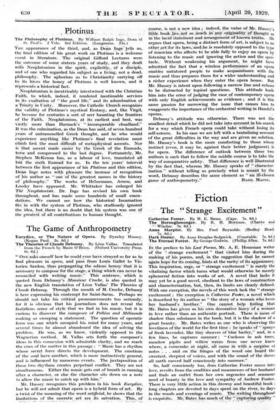The Game" of Anthropometry
Eurydice, or The Nature of Opera. By Dyneley Hussey.
" " (Kegan Paul. 2s. 6d.)
" ONE aski oneself how he could ever have strayed so far as to find pleasure in opera, and pasi from Louis Gallet to Vic: torien Sardou, thus pnipagating the odious heresy that it is necessary to compose for the stage, a thing which can never be reconciled with writing music." sentence,' Which is quoted from Debussy's Monsieur Croche, is also quoted in the new English translation -of Leon Vallas' The Theories of Claude Debussy. Through the mouth of M. Croche, Debussy is.here expressing his contempt for Saint-Saens. Perhaps we 'should not take his critical pronouncements too seriously, for it is obvious that his journalism does not reveal the fastidious sense of style that we find in his music, but it is 'curious to discover the Composer of Pelleas and Melisande making so sweeping a statement. The question of operatic form was one which occupied his mind for many years, and several times he almost abandoned the idea of solving the problem. He was, as we know, violently opposed to the Wagnerian method. M. Vallas sets forth the composer's ideas in this connexion with admirable clarity, and we reach 'the crux of the matter in this paeseige : " Music has a rhythm whose secret force directs the development. The emotions of the soul have another, which is more instinctively general, and is influenced by numerous events. The, juxtaposition of these two rhythms creates perpetual conflict. They are not simultaneous. Either the music gets out of breath in running after a character, or else the character sits down on a note to allow the music to catch up with him."
Mr. Hussey recognizes this problem in his book Eurydice, but he will not admit that opera is a hybrid form of art. By a twist of the meaning of the word artificial, he shows that the limitations of the operatic art are its salvation. This,. of course, is not a new idea_ indeed, the value of Mr. liussey's little boolcjies not so mucliAn aay.originality of thought as in the lucid statement and arrangement of known truths: . He argues that opera, being a distinct form of art, is subject to no Other arEfor its laws;_anchhe_is resolutely opposed to the type of musician who affects to be-able fully to enjoy an opera by listening to the music and ignoring the action and the spec. tack. Without weakening his argument, he might have admitted the fact that a wireless performance of an opera enables untutored people to make acquaintanoe with the music and thus- prepares them fora wider 'Understanding and a richer experience when they enter the opera house. But Mr. Hussey is intent upon following a narrow line and refuies to be distracted by topical questions. This attitude leads him into the error of judging the case_ of contemporary opera with only English achievements as evidence ; and it is this same passion for narrowing the issue that causes him to exaggerate the importance of the orchestral writing in Handel's operas.
Debussy's attitude was otherwise. There was not the smallest detail which he did not take into account in his search for a way which French opera could take without losing its self-esteem. In his case we are left with a tantalizing account of the great difficulties in the way and are given no solution. Mr. Hussey's book is the more comforting_ to those whose instinct (even, it may be, against their better judgMent) is for opera. The difference of outlook between these two authors is such that to follow the middle course is to take the Way of comparative safety. That difference is well illustrated by the fact that, whereas Mr. Hussey speaks of " Character- ization " without telling us precisely what is meant by the word, Debussy describes the same element as " an ill2elinsen
























































 Previous page
Previous page